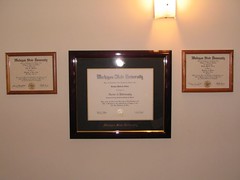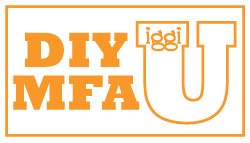Tomorrow we’ll pick up with our series on clues in non-mysteries!
We’ve talked before about getting an MFA. I’d love to get a grad degree, and I’d love to improve my writing. But in the end, I’m not sure an MFA program is the best choice for me, or for many writers.
And I’m not the only one who feels that way. Gabi Pereira of DIY MFA fame holds a real MFA. She’s grateful for the experience, she’s glad she did it, and she’d do it again, but if you ask her flat out whether she recommends an MFA, the answer is no.

As she actually told an interested MFA student:
“Seriously, if your only goal is to get published: go home, sit yourself at your workspace and write the book. If you think getting an MFA will help motivate you or improve your writing, then it sounds like a good fit for you. But if all you want is a ‘get-published’ card, then just go home and write the book.”
Among other points she makes in a whole series (several of which we mentioned when we talked about it last):
- An MFA is most likely not the only way to get where you want to be in writing (unless that’s teaching).
- It’s dang expensive!
- It’s not the best path to publication.
- Putting your life on hold to study writing isn’t realistic—learning to make writing part of our day-to-day lives is
- Non-literary fiction is often discriminated against.
To be sure, there are a lot of positives to an MFA as well:
- Writing is a priority
- Reading is a priority
- You can survive harsh critiques
- How to work within the writing community
That said, I haven’t totally given up hope. I just have to find a program that is local or low-res, well-funded, into genre fiction… that’ll happen, right?
What do you think? Is an MFA for you?
Photo by Joshua Nixon


 From what I understand (as I was told by professors), nearly all MFA programs create a certain type of writer—a literary one. Though I would like to style myself as a literary writer, right now my passions lie in genre fiction, and rare is the program where genre fiction (from romance and mystery to YA to scifi) is not at least stigmatized, if not denigrated. And leaving aside the fact that literary fiction is difficult to write and harder to sell, by no means does an MFA guarantee publication—or even publishable writing.
From what I understand (as I was told by professors), nearly all MFA programs create a certain type of writer—a literary one. Though I would like to style myself as a literary writer, right now my passions lie in genre fiction, and rare is the program where genre fiction (from romance and mystery to YA to scifi) is not at least stigmatized, if not denigrated. And leaving aside the fact that literary fiction is difficult to write and harder to sell, by no means does an MFA guarantee publication—or even publishable writing.